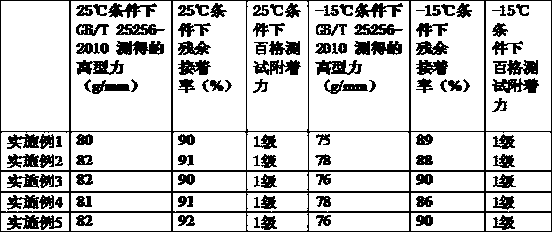Optical release film
A release film, optical technology, used in optics, optical components, film/sheet release liner, etc., can solve the problems of unstable performance, poor weather resistance, etc., to reduce transfer rate, improve coating ductility and Uniformity, the effect of improving residual adhesion
- Summary
- Abstract
- Description
- Claims
- Application Information
AI Technical Summary
Problems solved by technology
Method used
Image
Examples
Embodiment 1
[0025] Embodiment 1: an optical release film, comprising a base film layer 1, a release agent layer 2 coated on the surface of the base film layer 1, the thickness of the release agent layer 2 is 0.1 ~ 0.7 μm, the release agent layer 2 Forming agent layer 2 is obtained by curing the release agent, and the release agent is obtained from the following components by weight:
[0026] 100 parts of pre-polymerized resin,
[0027] 0.85 parts of methyl hydroquinone,
[0028] 35 parts of 3-propylene oxide,
[0029] 15 parts of dodecyl glycidyl ether,
[0030] 3.2 parts of 1-hydroxycyclohexyl benzophenone.
[0031] Described prepolymerized resin is obtained by following steps:
[0032] Step 1, put 32 parts of cyclohexyl methacrylate, 25 parts of β-carboxyethyl acrylate, and 9 parts of acrylic acid into a mixing tank, and stir at a low speed to form a primary mixture;
[0033] Step 2, mix the primary mixture of step 1, 100 parts of xylene, and 0.35 parts of benzoyl peroxide, and the...
Embodiment 2
[0038] Embodiment 2: an optical release film, comprising a base film layer 1, a release agent layer 2 coated on the surface of the base film layer 1, the thickness of the release agent layer 2 is 0.1 ~ 0.7 μm, the release agent layer 2 Forming agent layer 2 is obtained by curing the release agent, and the release agent is obtained from the following components by weight:
[0039] 100 parts of pre-polymerized resin,
[0040] 0.9 parts of methyl hydroquinone,
[0041] 30 parts of 3-propylene oxide,
[0042] 18 parts of dodecyl glycidyl ether,
[0043] 4.5 parts of 1-hydroxycyclohexyl benzophenone.
[0044] Described prepolymerized resin is obtained by following steps:
[0045] Step 1. Put 45 parts of cyclohexyl methacrylate, 28 parts of β-carboxyethyl acrylate, and 11 parts of acrylic acid into a mixing tank, and stir at a low speed to form a primary mixture;
[0046] Step 2. Mix the primary mixture of step 1, 100 parts of xylene, and 0.45 parts of benzoyl peroxide, and the...
Embodiment 3
[0051] Embodiment 3: an optical release film, comprising a base film layer 1, a release agent layer 2 coated on the surface of the base film layer 1, the thickness of the release agent layer 2 is 0.1 ~ 0.7 μm, the release agent layer 2 Forming agent layer 2 is obtained by curing the release agent, and the release agent is obtained from the following components by weight:
[0052] 100 parts of pre-polymerized resin,
[0053] 1 part methyl hydroquinone,
[0054] 28 parts of 3-propylene oxide,
[0055] 12 parts of dodecyl glycidyl ether,
[0056] 3.5 parts of 1-hydroxycyclohexyl benzophenone.
[0057] Described prepolymerized resin is obtained by following steps:
[0058] Step 1. Put 38 parts of cyclohexyl methacrylate, 22 parts of β-carboxyethyl acrylate, and 10 parts of acrylic acid into a mixing tank, and stir at a low speed to form a primary mixture;
[0059] Step 2, mix the primary mixture of step 1, 100 parts of xylene, and 0.38 parts of benzoyl peroxide, and then add ...
PUM
| Property | Measurement | Unit |
|---|---|---|
| Thickness | aaaaa | aaaaa |
Abstract
Description
Claims
Application Information
 Login to View More
Login to View More - R&D
- Intellectual Property
- Life Sciences
- Materials
- Tech Scout
- Unparalleled Data Quality
- Higher Quality Content
- 60% Fewer Hallucinations
Browse by: Latest US Patents, China's latest patents, Technical Efficacy Thesaurus, Application Domain, Technology Topic, Popular Technical Reports.
© 2025 PatSnap. All rights reserved.Legal|Privacy policy|Modern Slavery Act Transparency Statement|Sitemap|About US| Contact US: help@patsnap.com


